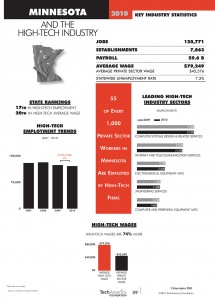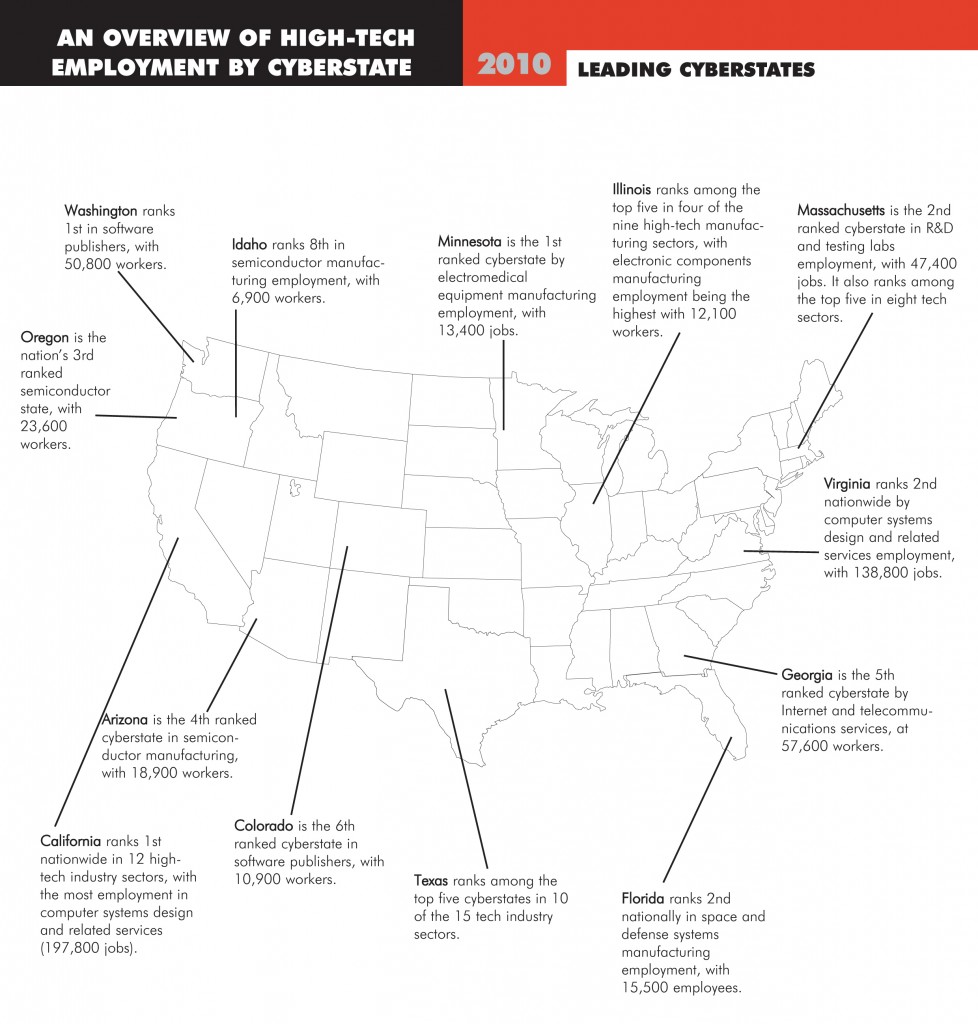 TechAmerica Foundation today released its 14th annual Cyberstates report detailing national and state trends in high-tech employment, wages, and other key economic factors. Cyberstates 2011: The Definitive State-by-State Analysis of the U.S. High-Tech Industry covers all 50 states, the District of Columbia, and Puerto Rico.
TechAmerica Foundation today released its 14th annual Cyberstates report detailing national and state trends in high-tech employment, wages, and other key economic factors. Cyberstates 2011: The Definitive State-by-State Analysis of the U.S. High-Tech Industry covers all 50 states, the District of Columbia, and Puerto Rico.
The U.S. high-tech industry lost 115,800 net jobs in 2010, for a total of 5.75 million workers. This two percent decline in tech industry employment was less than half of the 249,500 jobs lost in 2009, which followed several years of sustained growth. Over the longer term of 2007 to 2010 – the span of the economic downturn – the tech industry fared better then the private sector as a whole, with a four percent decline in employment versus a seven percent decline in the private sector.
That said, Minnesota’s high-tech industry lost 2,900 net jobs in 2010. Minnesota remained the 17th largest cyberstate, employing 120,800 tech workers with a total payroll of $9.6 billion in 2008.
These jobs are well compensated at an average wage of $79,200 – 74 percent more than the state’s average private sector wage. Tech industry job losses in Minnesota were led by the computer and peripheral equipment manufacturing sector (-1,100jobs) and electronics components manufacturing sector (-800 jobs).
“The tech industry is vital to Minnesota’s economy, led by electromedical equipment manufacturing,” said Margaret Anderson Kelliher, president & CEO of the Minnesota High Tech Association, a TechAmerica partner organization. “It is a tough job market and these numbers are part of a larger trend across the country. Minnesota will recover with policies that encourage education in science and technology and economic development tools such as the data center sales tax exemption recently approved by the state legislature.”
Philip J. Bond, TechAmerica’s President and CEO, talked the “Four T’s” of what’s needed to ensure growth in high tech sector jobs:
“Technology: We need robust federal investment in basic research to create the scientific base that companies can use to produce new products and innovations.
“Talent: We need to invest in STEM education to provide our children with the foundation in math and science that will prepare them for high paying careers while allowing highly skilled foreign nationals educated at our universities to remain in the United States and join American companies instead of returning to their home countries and competing against us.”
“Tax: We need to reform our tax system to make capital welcome. We are competing against countries that are aggressively implementing tax policies that lower the cost of business. We need comprehensive tax reform that attracts investments in technology and creates a framework that encourages repatriation of profits made by foreign operations of U.S.-based corporations.
“Trade: We need to open new markets to U.S. products and services by finishing the pending Free Trade Agreements with Panama, Colombia, and South Korea and continue to pursue other opportunities to expand trade.”
The report is over 125 pages and had numerous enlightening aspects to it. It can be purchased on the TechAmerica website at Member/Non-Member price of $150.

